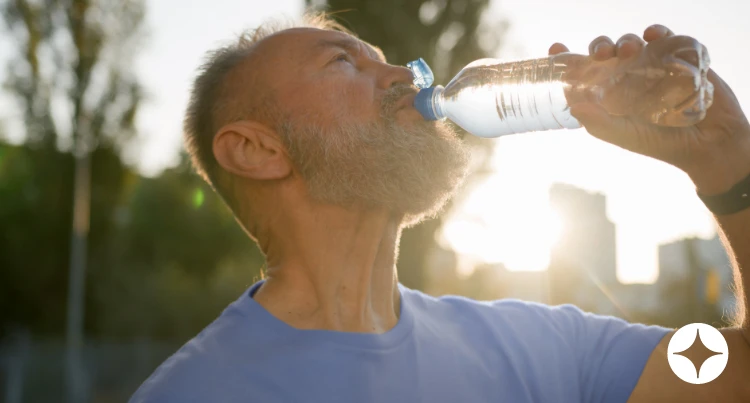
Getting a good night's sleep is essential for high-functioning performance in your daily life, but it's also crucial to maintain good health. Many factors can contribute to your quality of rest, including hydration and body temperature. As the weather heats up during the summer, you must pay closer attention to your sleep hygiene, particularly if you have a sleep disorder or require sleep equipment at night.
Impact of Hydration on Sleep
As the Sleep Foundation reports, hydration and sleep are closely linked 1. Failure to stay adequately hydrated can hurt your sleep, and interrupted sleep can also lead to dehydration.
When you're dehydrated, your mouth and nasal passages dry out, leading to snoring and a dry throat with morning hoarseness. If you don't drink enough water to keep your body hydrated, you may also notice uncomfortable symptoms like dry mouth, headaches or even muscle cramps. These sensations can make it difficult to fall asleep or wake you up during the night.
During sleep, the body releases a hormone called vasopressin that helps to prevent dehydration by encouraging water retention. Frequent interruptions in your sleep cycle can disrupt vasopressin production and lead to more water loss and dehydration.
Why People With Sleep Disorders Have an Increased Risk of Dehydration
Sleep disorders often result in mouth breathing, which can speed up the rate of fluid loss and contribute to dehydration. Plus, if the body isn't getting enough oxygen, it uses more water. The National Library of Medicine found that people who snore or experience interrupted breathing during sleep may have a higher risk of dehydration 2. Other symptoms associated with sleep disorders that exacerbate dehydration include frequent nighttime urination and night sweats.
How Summer Heat and Allergies Can Impact Sleep
The soaring temperatures of the summer make it more difficult for some people to sleep. Sweating and discomfort can prevent you from getting good sleep and cause you to sweat and lose more water at night, both of which can contribute to dehydration and worsening sleep disorder symptoms.
Sleep Education also discusses the impact of seasonal allergies on sleep quality 3. The increase in allergens such as pollen in the air can trigger symptoms like nasal congestion, making it even more difficult to breathe through the nose. This tends to lead to mouth breathing and an increased risk of snoring or sleep disorders. Other allergy symptoms, ranging from sneezing to itchy eyes, can disrupt your sleep. Along with any allergy treatments your doctor recommends, investing in an air purifier4 and maintaining good sleep habits can help relieve symptoms.
Preventing Dehydration for Better Sleep
It's possible to stop nighttime dehydration by practicing healthy habits that keep you hydrated. These simple tips can help:
- Drink plenty of water throughout the day.
- Fill your plate with high-water-content foods like fruits and vegetables.
- Keep your bedroom at a cool temperature to prevent sweating.
- Use a humidifier to avoid dry air that contributes to dehydration.
- Exercise early in the day so you have time to replace water lost from sweat.
- Limit alcohol and caffeine.
If you experience symptoms of dehydration or a sleep disorder, it's important to speak with your doctor. The right lifestyle changes and sleep therapy can make a big difference and restore your sleep quality so you once again feel healthy and rested.
Sources:
- Sleep Foundation.org. Surprising Ways Hydration Affects Your Sleep
- National Library of Medicine. Mouth opening/breathing is common in sleep apnea and linked to more nocturnal water loss
- Sleep Education.org. How Seasonal allergies affect sleep
- SoClean Air Purifier+




